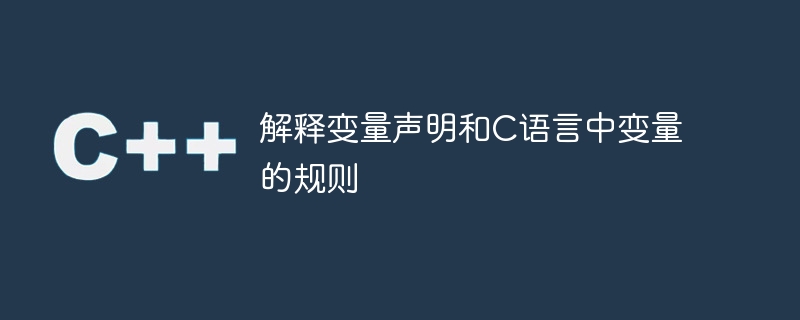

First let us understand what a variable is.
#It is the name of the memory location used to store data values.
Variables can take on different values at different points in time during execution.
Programmers can choose meaningful variable names that reflect their function or nature in the program.
For example, sum (sum), avg (average), total (total), etc.
The rules for variable naming are as follows:
The variable name must start with a letter.
In the ANSI standard, the maximum length of a variable is 31 characters. However, many compilers only consider the first eight characters.
Uppercase and lowercase letters are different. For example: total, TOTAL, and Total are 3 different variables.
Variable names cannot be keywords.
No spaces allowed.
The following is the syntax and example of variable declaration:
The syntax of variable declaration is as follows:
Datatype v1,v2,… vn;
Where, v1, v2,...vn are names of variables.
For example,
int sum; float a,b;
Variables can be declared in two ways −
local declaration − 'Local declaration' is to declare the variable inside the main code block, and its value is only Valid within this code block.
Global declaration − ‘Global declaration’ is to declare a variable outside the main code block, and its value is valid throughout the entire program.
The following is a sample program for local and global variable declaration in C language −
int a, b; /* global declaration*/
main ( ){
int c; /* local declaration*/
- - -
}The following is a C program for finding the selling price (SP) and cost price (CP) of goods −
Online demonstration
#include<stdio.h>
int main(){
float CostPrice, SellingPrice, Amount; //variable declaration
//costprice & sellingprice are variables and
//float is a datatype
printf("</p><p> product cost price: ");
scanf("%f", &CostPrice);
printf("</p><p> product selling price : ");
scanf("%f", &SellingPrice);
if (SellingPrice > CostPrice){
Amount = SellingPrice - CostPrice;
printf("</p><p> Profit Amount = %.4f", Amount);
}
else if(CostPrice > SellingPrice){
Amount = CostPrice - SellingPrice;
printf("</p><p> Loss Amount = %.4f", Amount);
}
else
printf("</p><p> No Profit No Loss!");
return 0;
}The output is as follows−
product cost price : 240 product selling price : 280 Profit Amount = 40.0000
The above is the detailed content of Explain the rules of variable declaration and variables in C language. For more information, please follow other related articles on the PHP Chinese website!
 vcruntime140.dll cannot be found and code execution cannot continue
vcruntime140.dll cannot be found and code execution cannot continue
 pr shortcut key
pr shortcut key
 How to dress up Douyin Xiaohuoren
How to dress up Douyin Xiaohuoren
 What does data intelligence mean?
What does data intelligence mean?
 parentnode usage
parentnode usage
 How to read data from excel file in python
How to read data from excel file in python
 What to do if the computer fakes death
What to do if the computer fakes death
 What to do if css cannot be loaded
What to do if css cannot be loaded
 What is the difference between JD International self-operated and JD self-operated
What is the difference between JD International self-operated and JD self-operated




